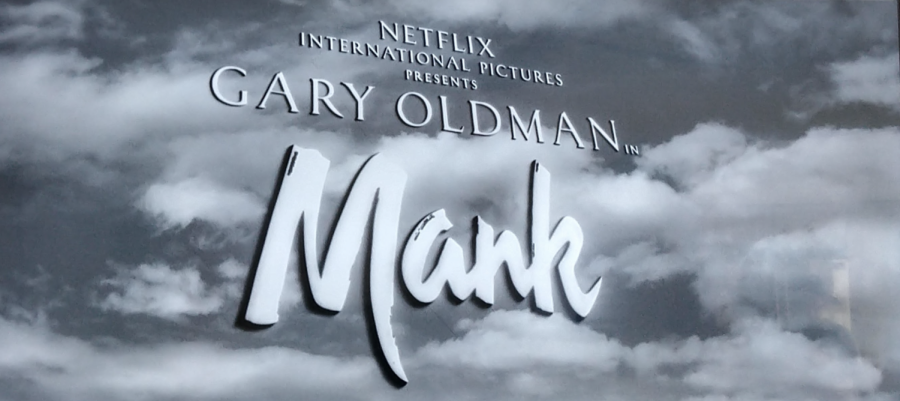“Mank”: A Unique Hollywood Parable For Today
The title card for “Mank” is designed like those of Golden Age Hollywood movies.
Although its story and characters are from nearly a century ago, the themes and political backgrounds of “Mank” make it all the more timely in our current times of fake news and political involvement. It seems unlikely that this insight into our problems based on modern historical events should come from a biopic about Herman Mankiewicz, the less-remembered screenwriter of Orson Welles’ masterpiece “Citizen Kane”, but in seasoned director David Fincher’s hands, the film becomes more than the Oscar bait “classic Hollywood” story with a black-and-white schtick it seemed destined to become.
“Mank” begins unexpectedly. It is the start of the culminating event of the screenplay, that being Herman Mankiewicz’ (Gary Oldman) retreating to a rural house to write the original draft of “Citizen Kane” for Orson Welles. Already these forthcoming themes of fake news and Hollywood’s meddling in politics are complicated, as in reality Mankiewicz did not write “Kane” by himself; it was a film-conspiracy-theory started in large part by critic Pauline Kael. After this introduction to Mank, his secretary Rita (Lily Collins), Herman’s brother Joseph (Tom Pelphrey) and Welles himself (Tom Burke), we are sent back to nearly a decade beforehand, where at MGM Studios Mankiewicz, known to all as Mank, works as a veteran scriptwriter, along with newcomer Joseph. Mank has a complex working relationship with his boss Louis Mayer (Arliss Howard) and he is not fond of the power in the film industry held by newspaper magnate William Randolph Hearst (Charles Dance). However, the supporting character who most shapes the events to come for Mank is Marion Davies (Amanda Seyfried). Marion is Hearst’s mistress who is unsuccessfully trying to break back into movies after the silent era’s end and is also a muse for Mank.
As we toggle back and forth from the first half of the 1930s to those few weeks in 1940, we see the parallel stories. The first being one of Mank’s attempts to stop Hollywood’s collective propaganda campaign against progressive gubernatorial candidate Upton Sinclair (Bill Nye, in an unprecedented cameo) and the last one showing Mank trying to finish his unfilmable script based on the people of his past in a mere few weeks, while going through a few obstacles.
“Mank” is at its heart a complex movie. It’s a screenplay and is extremely nonlinear (similar to “Citizen Kane”). It takes many liberties with its pacing and the style of the whole film from cinematography and production design to dialogue comes off as a film from the time of the story, or more accurately, a pastiche of that era of film. These features, however, do not detract from the movie’s success in conveying its message and story. The screenplay itself, written by director Fincher’s late father Jack, through its nonlinearity and its stylizations of a 30s melodrama, allow the viewer to see the world of Hollywood through Mankiewicz’s critical eyes, and to also see it through the change in Hollywood through the decades. In Hollywood today, the stage of filmmaking is given with little freedom to creators from the big studios and the politically-charged use of propaganda and subtlety. Although Jack Fincher wrote “Mank” before Mank’s death in 2002, its dormancy until today allows it to have a greater significance than if it had been made twenty years ago– in an era where political leaders call “fake news” and use belittling pieces of televised propaganda against their rivals. It is interesting to note that if “Mank” had been made at the turn of the century, its reprisal of the Sinclair election would have complemented the historic recall of Governor Gray Davis in 2003. The way the two stories switch back and forth like a tennis ball across the court, come to their climactic scenes at the same point in two completely different ways after almost two hours of slow build-up is extremely well done and is professional in its timing.
Another one of the movie’s strong-points is its behemoth cast. The lead is played by the indomitable Gary Oldman, who after being in the film industry for decades, brings nuance to the title character. The supporting cast of the film is the group worth remembering. From Charles Dance’s portrayal of the malicious news leader Hearst, to Arliss Howard’s cathartic performance as Mayer, and especially two performances in particular– Tom Burke as a seething and strikingly similar-looking Orson Welles and Amanda Seyfried in what is probably the best performance of her career as the mysterious, charismatic, and charming Marion Davies– this supporting cast brings a level of cinematic superiority and overplayed realism to the film.
One of the main parts of the behind-the-scenes aspects of this film is not the cinematography, the sound, or the production design. It is in fact the score. Compositional collaborators Atticus Ross and Trent Reznor, in their fourth musical effort for Fincher, manage to go past the mainly electronic elements of their previous work to give a diverse musical background to the film. From orchestral works with striking chords in the beginning, to a limpid waltz against the musings of Mank and Davies, to a rollicking jazz medley during the night of the 1934 California gubernatorial election, this score manages to cross between several different genres to bring the perfect undertone to the scene it accompanies.
The one main detraction from the movie’s near-greatness is the blatant falsities shown in the portrayal of Mankiewicz as the sole creator and writer of the immaculate and revolutionary story of “Citizen Kane”. After Pauline Kael’s controversial essay, “Raising Kane” first envisioned the idea of a Welles-less “Kane”, the theory of Mankiewicz as a sole screenwriter was heavily disproved. However, this did not stop Jack Fincher from showing the writing of “Kane” as heavily one-sided and Welles as a shady figure behind the scenes doing nothing but egging Mank on to finish the screenplay. Had it not been for this brutal prestidigitation of the facts of cinematic history, “Mank” would surely have already become one of David Fincher’s greatest films, joining the pantheon of his past works (like “Fight Club” and “The Social Network”). The inherent contradiction between the theme of propaganda as shown by the Sinclair smear campaign and the smear campaign against Orson Welles shown by the film itself, even if it is supposed to be a nuanced juxtaposition of the reaches of fake news, is simply unforgivable.
Despite this error in truth, “Mank” still manages to deliver everything it was asked for and more. The rest of the screenplay, the aforementioned cast, along with the score and all of the technical aspects, flourish under the delicate, uncompromising, yet pessimistic touch of David Fincher. Even with its one near-fatal flaw, “Mank” is still well worth a watch, and it will fare well at the upcoming Academy Awards.
4/5 Feathers












